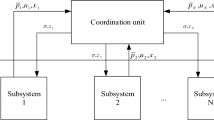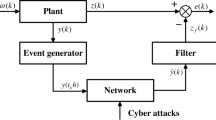Abstract
This work develops hybrid models for large-scale singular differential system and analyzes their asymptotic properties. To take into consideration the discrete shifts in regime across which the behavior of the corresponding dynamic systems is markedly different, our goals are to develop hybrid systems in which continuous dynamics are intertwined with discrete events under random-jump disturbances and to reduce complexity of large-scale singular systems via singularly perturbed Markov chains. To reduce the complexity of large-scale hybrid singular systems, two-time scale is used in the formulation. Under general assumptions, limit behavior of the underlying system is examined. Using weak convergence methods, it is shown that the systems can be approximated by limit systems in which the coefficients are averaged out with respect to the quasi-stationary distributions. Since the limit systems have fewer states, the complexity is much reduced.
Similar content being viewed by others
References
Campbell, S. L., Singular Systems of Differential Equations, I & II, San Francisco: Pitman, 1980 & 1982.
Cheng, Z. L., Hong, L., Zhang, J. F., The optimal regulation of generalized state-space systems with quadratic cost, Automatica, 1988, 24: 707–710.
Dai, L., Singular control systems, Lecture Notes in Control and Information Sci., vol. 118, Berlin: Springer-Verlag, 1989.
Huang, J., Zhang, J. F., Impulse-free output regulation of singular nonlinear systems, Internt. J. Control, 1998, 71: 789–806.
Sethi, S. P., Zhang, Q., Hierarchical Decision Making in Stochastic Manufacturing Systems, Boston: Birkhäuser, 1994.
Yin, G., Zhang, Q., Continuous-time Markov Chains and Applications: A Singular Perturbation Approach, New York: Springer-Verlag, 1998.
Zhang, Q., Yin, G., On nearly optimal controls of hybrid LQG problems, IEEE Trans. Automat. Control, 1999, 44: 2271–2282.
Simon, H. A., Ando, A., Aggregation of variables in dynamic systems, Econometrica, 1961, 29: 111–138.
Pervozvanskii, A. A., Gaitsgori, V. G., Theory of Suboptimal Decisions: Decomposition and Aggregation, Dordrecht: Kluwer, 1988.
Phillips, R. G., Kokotovic, P. V., A singular perturbation approach to modelling and control of Markov chains, IEEE Trans. Automat. Control, 1981, 26: 1087–1094.
Il’in, A., Khasminskii, R., Yin, G., Asymptotic expansions of solutions of integro-differential equations for transition densities of singularly perturbed switching diffusions: Rapid switchings, J. Math. Anal. Appl., 1999, 238: 516–539.
Khasminskii, R. Z., Yin, G., Zhang, Q., Asymptotic expansions of singularly perturbed systems involving rapidly fluctuating Markov chains, SIAM J. Appl. Math., 1996, 56: 277–293.
Khasminskii, R. Z., Yin, G., Zhang, Q., Constructing asymptotic series for probability distribution of Markov chains with weak and strong interactions, Quart. Appl. Math., 1997, 55: 177–200.
Yin, G., Zhang, Q., Control of dynamic systems under the influence of singularly perturbed Markov chains, J. Math. Anal. Appl., 1997, 216: 343–367.
Yin, G., Zhang, Q., Badowski, G., Asymptotic properties of a singularly perturbed Markov chain with inclusion of transient states, Ann. Appl. Probab., 2000, 10: 549–572.
Yin, G., Zhang, Q., Badowski, G., Singularly perturbed Markov chains: Convergence and aggregation, J. Mult. Anal., 2000, 72: 208–229.
Davis, M. H. A., Markov Models and Optimization, London: Chapman & Hall, 1993.
Iosifescu, M., Finite Markov Processes and Their Applications, Chichester: Wiley, 1980.
Billingsley, P., Convergence of Probability Measures, 2nd ed., New York: Wiley, 1999.
Ethier, S. N., Kurtz, T. G., Markov Processes: Characterization and Convergence, New York: Wiley, 1986.
Kushner, H. J., Approximation and Weak Convergence Methods for Random Processes, with Applications to Stochastic Systems Theory, Cambridge, MA: MIT Press, 1984.
Kushner, H. J., Yin, G., Stochastic Approximation Algorithms and Applications, New York: Springer-Verlag, 1997.
Kendrick, D., On the Leontief dynamic inverse, Quat. J. Economics, 1972, 86: 693–696.
Brunner, A. D., Testing for structural breaks in U.S. post-war inflation data, Mimeo, Board of Governors of Federal Reserve System, Washington D.C., 1991.
Cai, J., A Markov model of unconditional variance in ARCH, J. Business Economic Statist, 1994, 12: 309–316.
Hamilton, J.D., Susmel, R., Autoregressive conditional heteroskedasticity and changes in regime, J. Econometrics, 1994, 64: 307–333.
Hansen, B. E., The likelihood ratio test under nonstandard conditions: Testing Markov trend model of GNP, J. Appl. Economics, 1992, 7: S61-S82.
Author information
Authors and Affiliations
Corresponding author
Rights and permissions
About this article
Cite this article
Yin, G., Zhang, J. Hybrid singular systems of differential equations. Sci China Ser F 45, 241–258 (2002). https://doi.org/10.1360/02yf9022
Received:
Issue Date:
DOI: https://doi.org/10.1360/02yf9022




